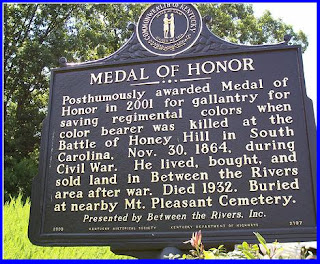In 1863 when the call went out to form black regiments, the call was so great in New England that enough recruits were present to form two black regiments from Massachusetts. Thus the 55th US Colored Infantry was formed. This would be sometimes called the sister regiment to the famous 54 Massachusetts Colored Infantry depicted in the movie Glory!
The men came from everywhere. From Massachusetts, Ohio, Pennsylvania and New York they enlisted eagerly. After being drilled and trained, they were sent to North Carolina, then Morris Island where they would work for many weeks in the trenches.
On his massive website Lest We Forget, historical researcher Bennie McRae describes how this regiment became quickly demoralized when it was learned that they were not to be paid the same as white soldiers. The typical pay was $13 per month for volunteers. Black soldiers, it was decided would be paid $10.00 per month. When they learned of this, they were immediately upset that their lives were valued less that the lives of white soldiers. They refused the pay of $10 and demanded to be treated equally as they had been guaranteed.
Mr. McRae reported:
For months, the government refused to settle the pay issue, and morale among the soldiers of the 55th began to detiorate, meanwhile---they continued to serve as soldiers. Their service on Folly's Island and other detachments was still going on though the issue of equal payment continued. Finally word came in August of 1864 that it was finally decided that all colored troops were to receive equal pay from January 1, 1864 forward.
Again, Mr. McRae succinctly describes the time when the soldiers received all of their back pay:
The morale was boosted among all of the men after payment and the following month, they would all find themselves to be tested in a major battle--the Battle of Honey Hill. Among the hundreds of men in the 55th, was a young Kentucky born man Andrew Jackson Smith. He was a slave of Elijah Smith of Kentucky and when the war broke out, Elijah Smith had planned to take Andrew and other male slaves into battle with him into the Confederate war front. But Andrew had no desire to follow his master to the confederate battle front and so he and another slave took flight on foot. They made their way 25 miles on foot, till they reached the Union line and presented themselves to the Union soldiers encamped there. He connected with an Illinois regiment where he was wounded near Shiloh. After recovering, he was still determined to enlist in the Union Army as a soldier.
He was mustered into the 55th Massachusetts and was serving in the regiment when they were ordered to Honey Hill, SC. While crossing a swamp the unit came under very heavy fire from the enemy. The color barrier was hit and mortally wounded.
Smith rushed to the side of the color barrier, took up the colors and carried them throughout the rest of the battle. He was exposed to the enemy but never lost the colors and never let them fall. In spite of the heavy fire under which he found himself, the colors of the 55th Massachusetts did not fall, thanks to the actions of Corporal Smith. He was later promoted to Color Sergeant two months later.
After the war, Andrew Jackson Smith returned to Kentucky, purchased land there and remained. In 1916, many year after the famous battle, he was nominated for the Medal of Honor but it was denied.
However, in 2001 a mere 137 years after the battle of Honey Hill where he earned the medal it was finally awarded to him posthumously by President Bill Clinton, in 2001.
His descendants received it at a White House ceremony. A marker has also been erected reflecting this honor and it is placed on the road near the cemetery where he is buried.


No comments:
Post a Comment